This article is based on content included in the 2022 edition of the EventMB Mobile Event App Guide. The full guide is a highly recommended resource for all event professionals interested in mobile event apps. Download your copy for free today!
Responding to Covid restrictions, the event industry saw the rapid adoption and implementation of virtual events. On the flip side, the use for mobile event apps was diminished, whose primary applications exist in the realms of face-to-face experiences. Now, with the steady return of in-person and hybrid event experiences, current forecasts suggest a rebound of the mobile event app.
How did the pandemic-induced slump affect the event app market, and what can planners expect to see from this technology with the return of in-person experiences? Do event planners still see the relevance of mobile event apps? Here, we give insights on the topic from research conducted to produce the EventMB Mobile Event App Guide alongside subsequent interviews with event professionals.
Back to Planning for In-Person Experiences
In contrast to 2021, when most events took place within the virtual events space, this year, the relaxation or removal of restrictions on gatherings is signaling the return of face-to-face events. Recent data shows that 67 percent of vendors have contracts in place for in-person events for the second or third quarter of the year, and only 22 percent will not be returning to in-person events until 2023.
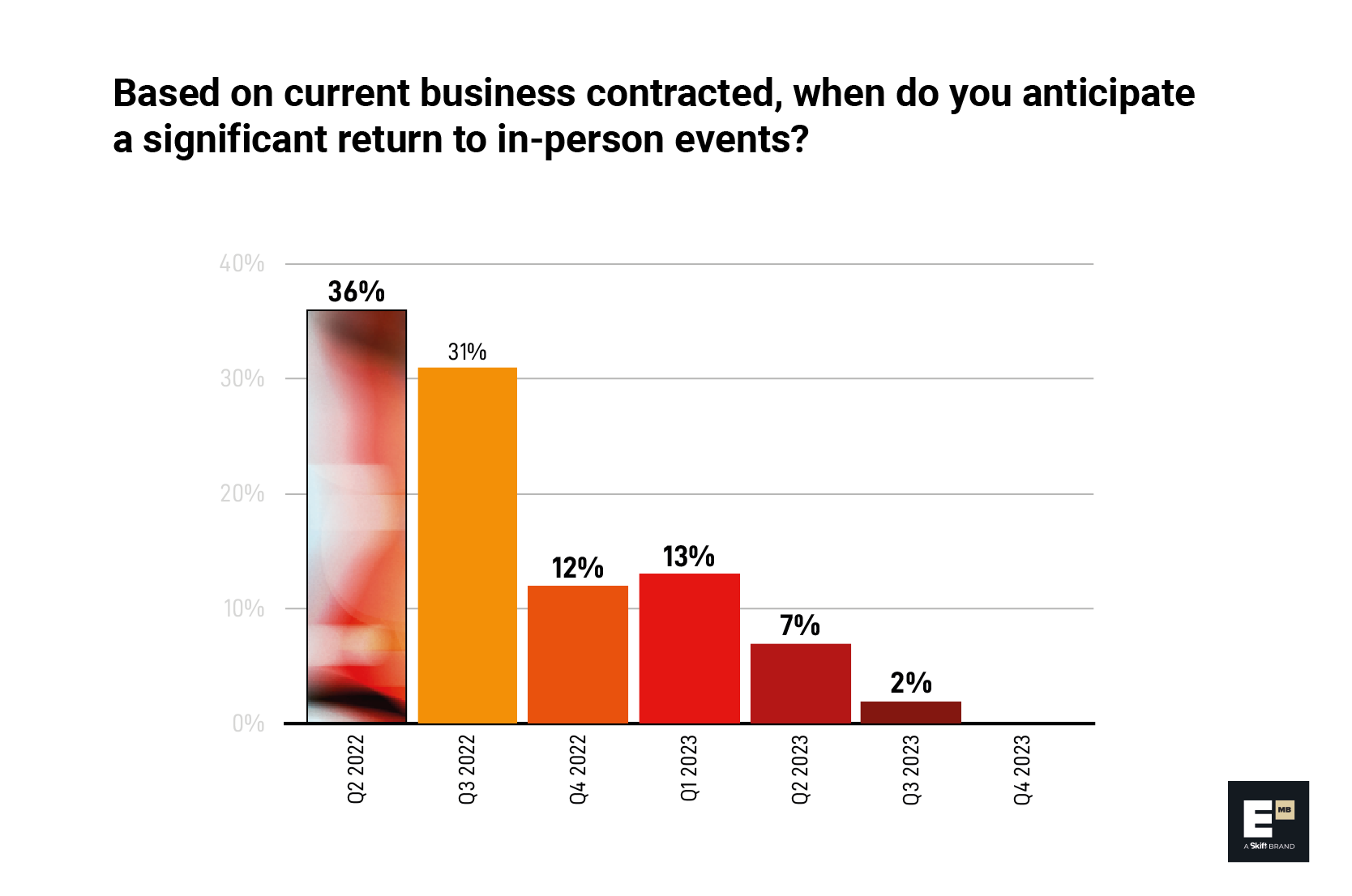
Confirming the above, Liz King Caruso, CEO at Techsytalk in the United States, expects in-person events to return in the second quarter. Whereas Rudi van der Vyver, CEO of We Are Virtual in South Africa, noted that client trends for in-person events lean towards the third quarter with an upward trajectory. However, van der Vyver elaborated that a significant increase would only arrive in 2023, as the South African government eases more restrictions.
Similarly, Sina Bünte, a European-based founder of DigitalMind.events and manager at EventProfsBreakShit, predicted a sharp rise in onsite events in the fourth quarter only, possibly owing to indications of another wave mid-year.
App Enhanced In-Person Events = Hybrid
Mobile event app providers are optimistic about the development of hybrid event experiences with 59 percent reporting a majority of confirmed events in a hybrid format for 2022. This percentage is significantly higher than the 23 percent of providers that have mostly contracted for virtual-only events this year. These observations are subject to change as Covid policies evolve, vaccination numbers rise, and various major events move forward.
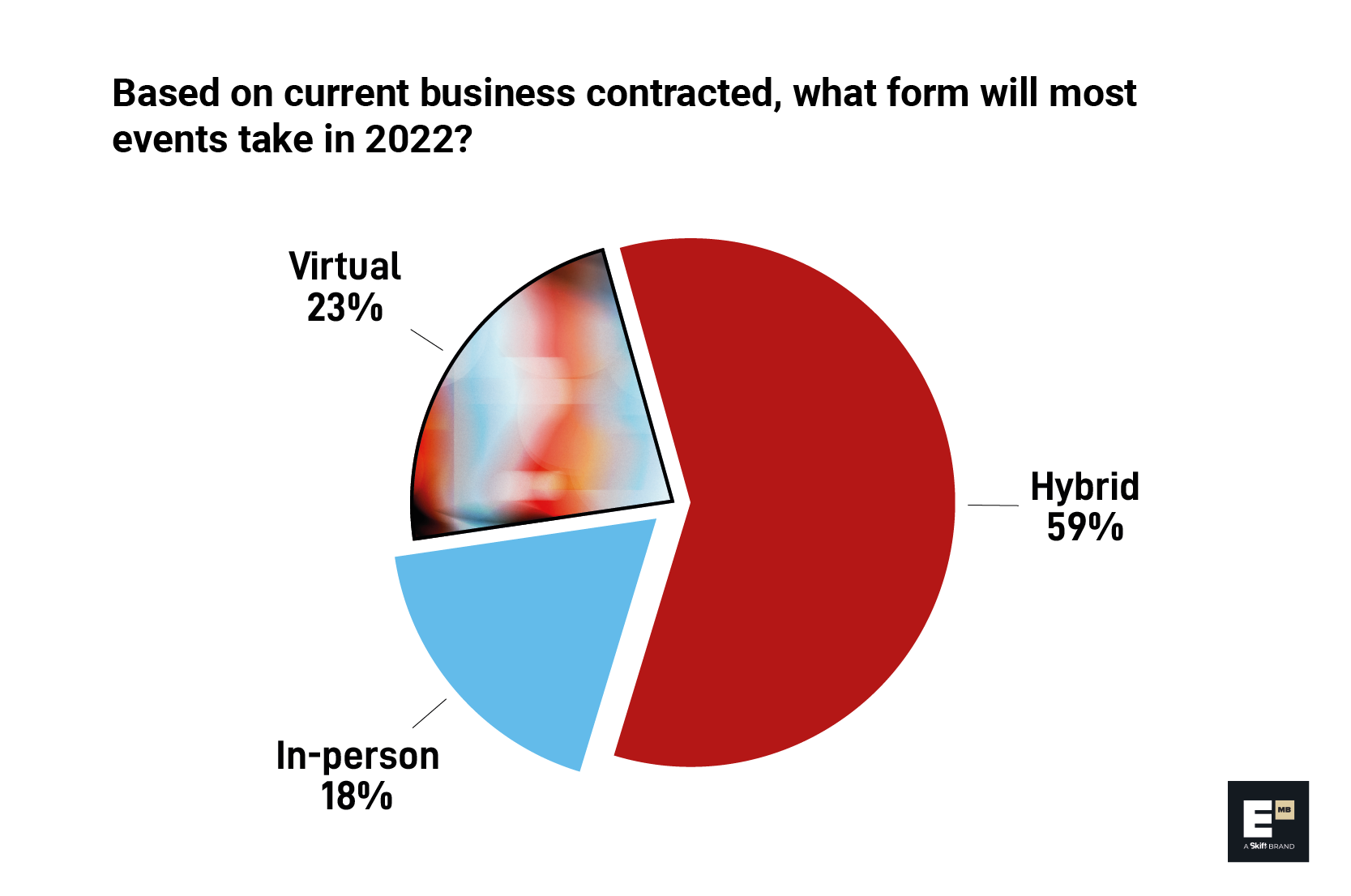
The contrast to events in 2021 is significant as 70 percent of mobile event app providers cited virtual-only events as the primary format supported.
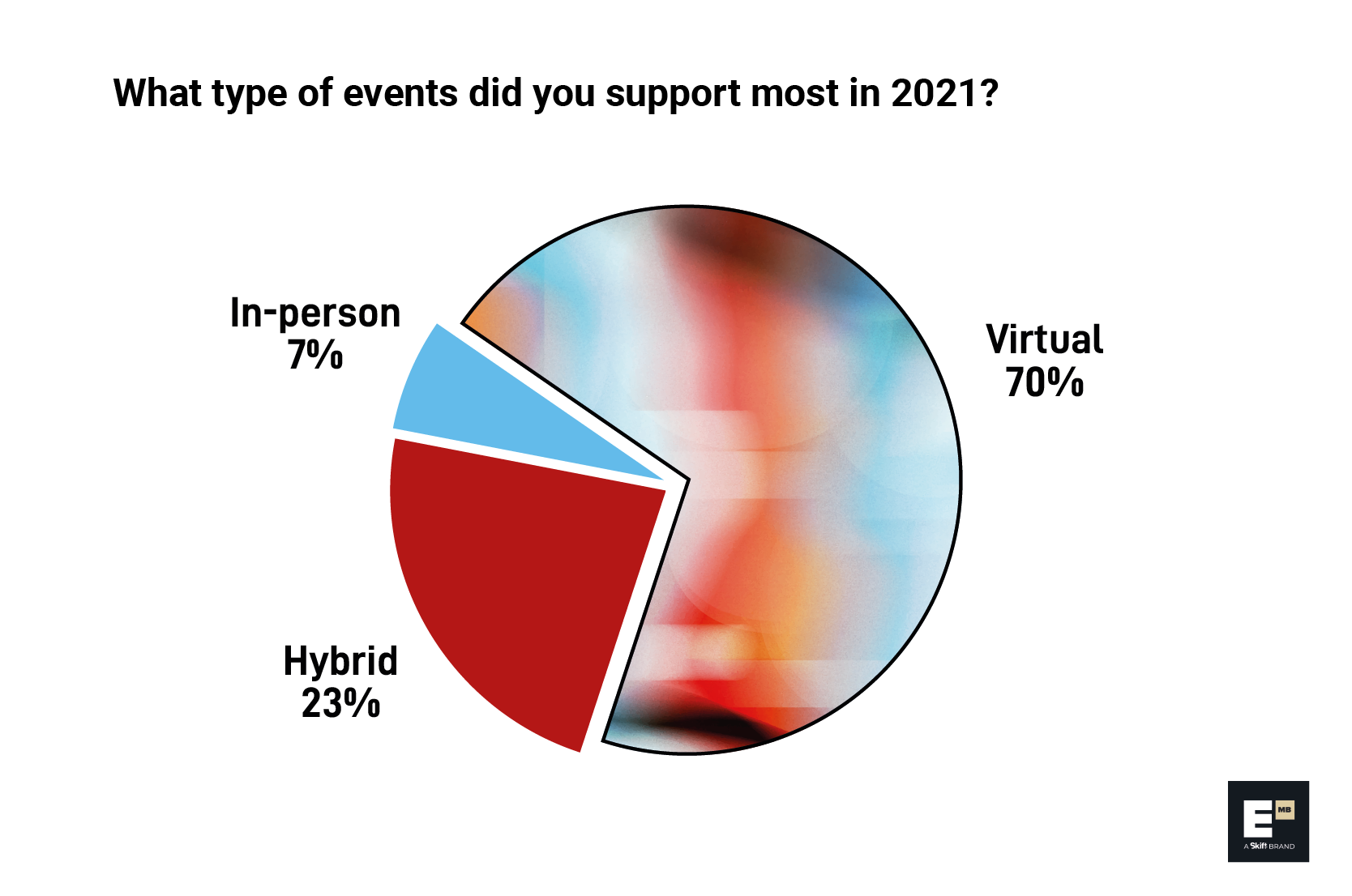
Still, there were some positive impacts for planners as providers proved to be compassionate business partners in 2021. Whereby, 82 percent of mobile app providers developed more flexible contract terms to accommodate another year of uncertainty marked by postponed dates and pivots to online experiences.
Apps Support Safer Events
While the industry is ready for the return of in-person crowds to convention centers and hotels, mobile app providers are behind the curve in one key piece of the puzzle — a contactless approach.
“For organizers and participants alike, it would be great to have functions such as test results or vaccination statuses included in the standard event apps,” Bünte said. She added that mobile apps could, in the future, support the hygiene protocol at events with contactless check-ins and exchange of business cards, thus enhancing networking opportunities more safely.
At present, just 45 percent of companies offer the ability to display proof of a Covid vaccine or negative test. And while the rest of the consumer-facing mobile landscape has embraced a contactless approach for nearly everything, only 63 percent of providers offer contactless networking.
Current Demand
Changes in demand for products and services linked to mobile event apps indicate how the market is evolving. Sixty-one percent of respondents are currently seeing higher demand for their services, down only marginally from 64 percent in 2021.
To provide context, 11 percent of vendors are still seeing lower demand, but that number is an improvement from last year when 20 percent reported lower demand. In addition, the percentage of providers with the same demand level as the prior year has jumped from 11 percent in 2021 to 26 percent this year.
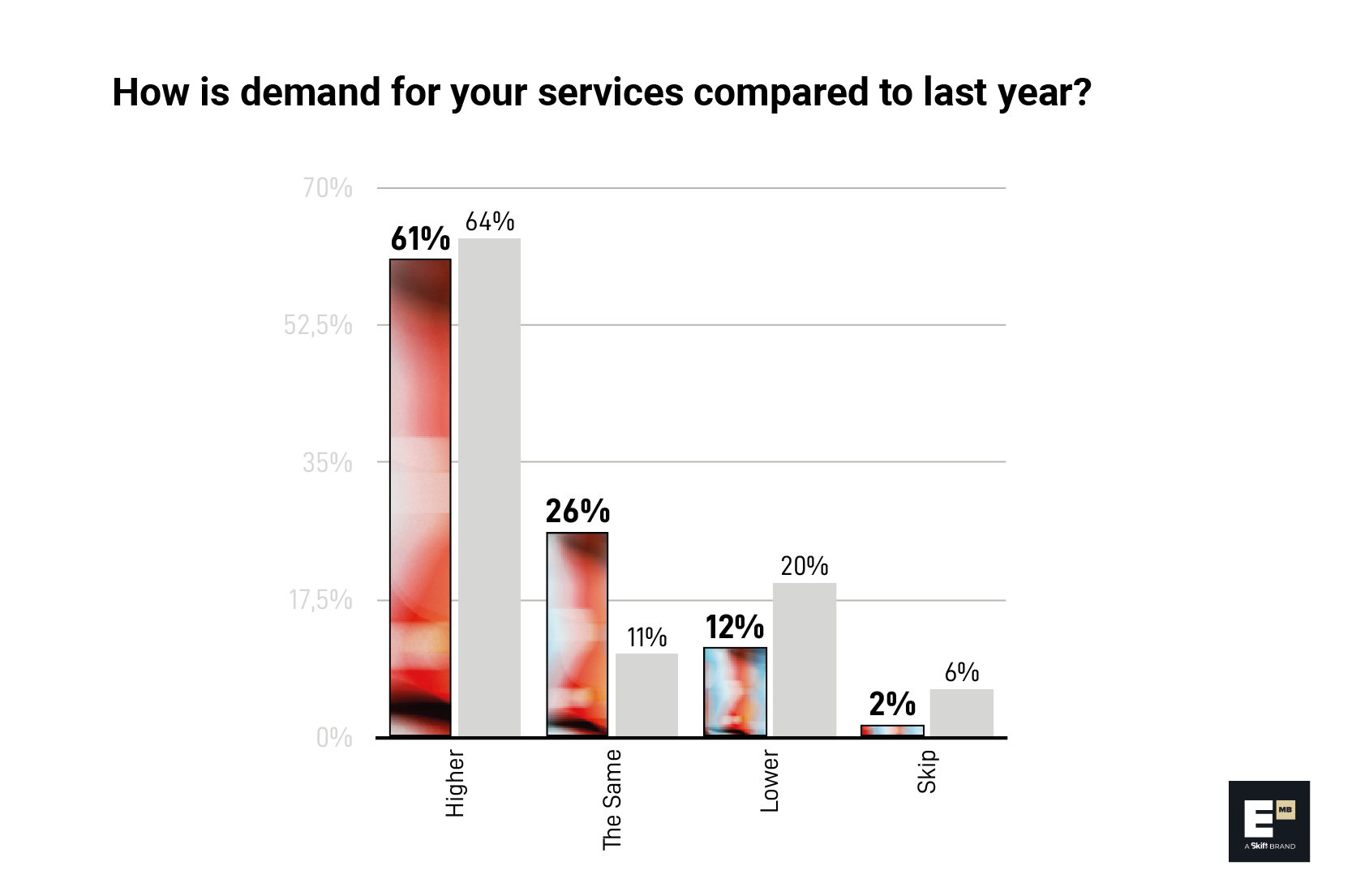
This year’s numbers are promising; however, it’s crucial not to forget the low point of 2020 and early 2021 due to the Covid pandemic reflected in the 2021 survey results. For many mobile event app providers, 2020 was a bad year.
The current trend is undoubtedly positive, and we see no reason for it not to continue, especially with the return of in-person experiences. “Event apps are crucial for most in-person events. So, [when] more in-person gatherings take place again, the use of event apps will increase again too,” Bünte explained.
Van der Vyver added that mobile event apps are a great way to engage and connect in-person and virtual audiences when hosting a hybrid event — making them the perfect tool to utilize within this format. Because of this, perhaps, mobile event apps may become more relevant than their pre-Covid use, as the industry sees a rise in hybrid event popularity?
Increased Competition
Currently, perceived competition levels in the mobile event app space are high, even topping those reported in 2021. In the pre-Covid-pandemic period, those that disclosed competition was increasing sat just above the 30 percent mark; the near doubling of this figure is a clear indicator of a change in market dynamics.
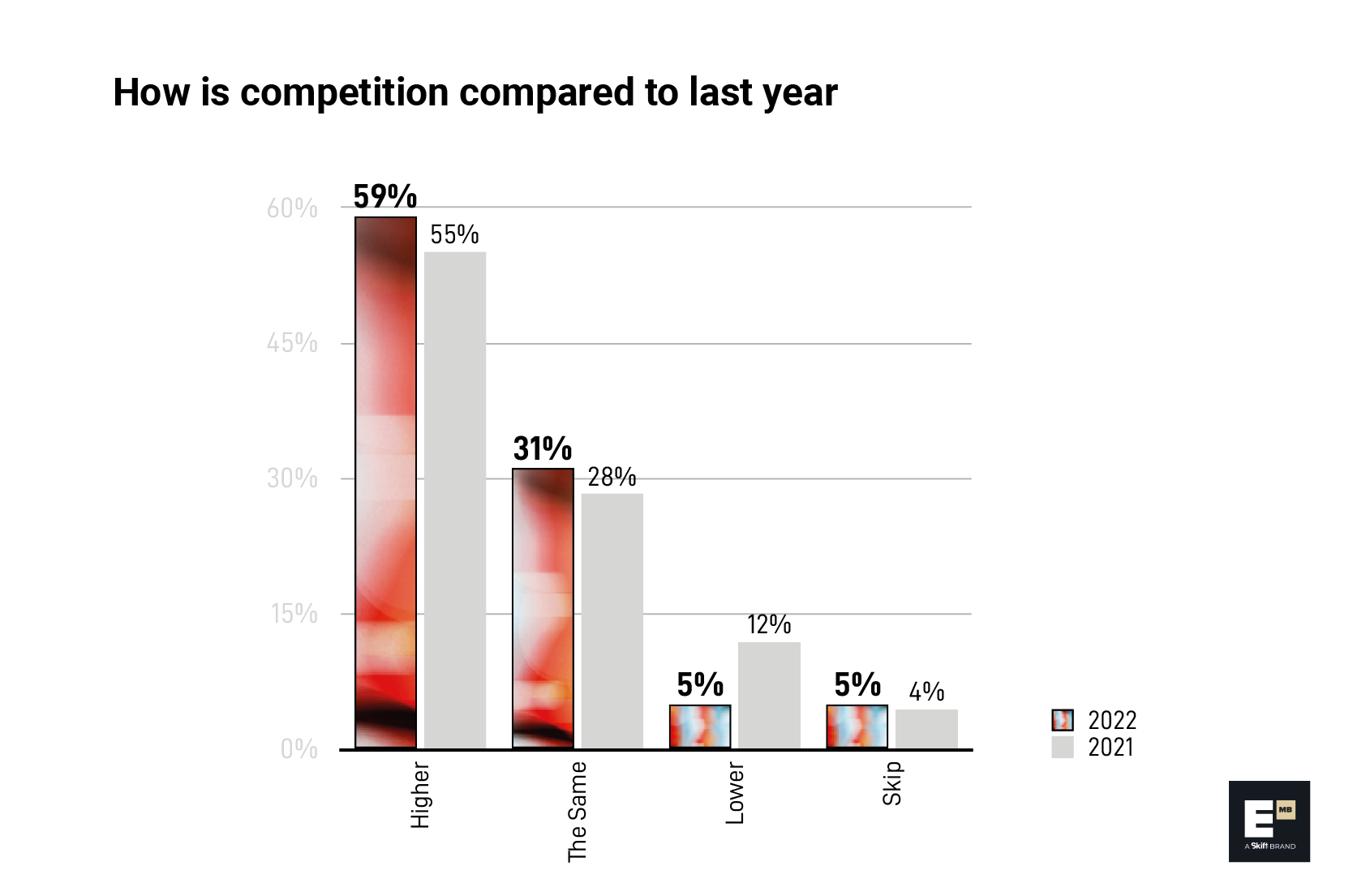
In addition, there is a shortage of new companies entering the mobile event app market, suggesting that the perceived competition may arise from an overlap with the interconnected virtual event platform sector. Bünte highlights that many event app providers expanded their portfolio over the past two years, likely causing the overlap. Further impacts may also be due to current mergers and acquisitions, affecting vendors with products and services across both sectors.
However, van der Vyver added that while these markets tend to see themselves as competitors, regardless of where they position themselves within the space, they are “complementary” and should, instead, focus on operating within an integrated model approach.
Interestingly, with a notable increase in perceived competition, none of the event professionals interviewed could recall seeing a substantial uptick in marketing efforts from mobile event app providers. Bünte did, however, refer to a few instances whereby a virtual event platform promoted their app as a hybrid event solution for connecting in-person and virtual audiences.
Planners Approach to the Market
While the perception of competition is high, some event planners feel mobile event apps have lost relevance over the past 24 months. “[M]obile event apps have not really been a concern for most event producers in the last two years and have therefore fallen off the top of the list… Of course, I think we will see a return to that as in-person becomes more relevant,” Caruso explained.
Regardless, even if planners have recently steered clear of mobile event apps, the current market needs could mean they are spoilt for choice when picking a provider, meaning existing partners will have to level up their offerings.
“We are very selective of our partners and would stick with past partners. But, they need to ensure that their technology evolves with the industry and our client requirements based on the desired event objectives and architecture,” van der Vyver said.
Van der Vyver approaches tech providers in a best-of-breed style, selecting two different providers for events — an event platform and an app, as he believes specialist knowledge is required for each. He would, however, like to see partners developing features for smoother integrations between the respective systems.
“I’m always on the lookout for new players in the field, but I’m also sure past partners have improved their services and functionalities, so I would approach them again,” Bünte added.
Making a Comeback?
With hybrid events fast becoming the preferred event format of 2022, we can expect to see a resurgence in mobile event apps to facilitate connection, engagement, and enhance experiences. However, tech providers may need to update their product and service offerings to evolve with and meet current event needs while responding to an increase in perceived market competition levels.
Caruso concluded, “I think everyone is shopping around at this point. Technology has evolved so much in the past two years, and most of our clients are pursuing hybrid, which will [need] different things and most likely requires companies to change the products they had been using pre-pandemic.”
To learn more, download the full EventMB Mobile Event App Guide





